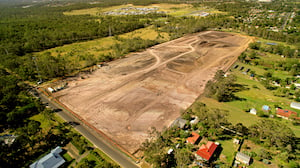Hard Costs vs. Soft Costs In Construction & Real Estate Development
What are hard costs and soft costs? What's the difference and how do they impact my development project? How does this all fit into the real estate development process?
We explore all that and more in our latest video below:
Guide to video
- The difference between a profitable investment and a money pit is often a failure of cost budgeting.
- Many developers don't understand the difference between hard costs and soft costs.
- You can't properly manage expenses if you don't kinds of costs you're exposed to and how they impact each other.
Video transcript follows
Hi –
It’s Matt with Marsh & Partners.
We’re a Raleigh-based development and national consulting firm that helps business owners and investors maximize their real estate and transform their businesses.
----------
Today we are going to touch on a topic that really has major implications for the success of a development or construction project – and that’s cost budgeting.
In order to properly build a development budget, it’s important to understand the component costs that may be incurred, and to accurately identify what’s driving those cost line items.
As a developer, it’s important to break down costs by the phase of the project, but you’ll also want to differentiate between direct and indirect costs, or hard costs and soft costs.
Hard costs and soft costs are two broad categories that are used to distinguish between types of costs incurred during the real estate development and construction process.
Let’s first start with a quick discussion of hard costs. They’re expenses that are generally related to the physical construction of a building. If you think about construction costs in terms of their tangibility – can you feel them or touch them – it’s an easy way to quickly visualize hard costs in terms of their impact on a project.
Things like construction materials and labor, for both the general contractor and any subcontractors, parking and paving work, sitework, utilities, and landscaping – they’re all examples of hard costs.
On the other hand, soft costs are a little less intuitive. They’re expenses that are generally not directly tied to the construction of a building. They’re not tangible and may be less evident than hard costs to the physical development of a property.
Things like architecture and engineering (or A&E) expenses, review and permit fees, maintenance and insurance costs, inspection fees, administrative and financing costs, and legal and accounting fees are examples of soft costs you’d encounter during a development project.
Soft costs can continue to impact a project even after you’ve completed construction. As you build your development budget, you’ll want to account for a property’s ongoing maintenance, operation, and security expenses, and other recurring fees.
When you’re differentiating between hard and soft costs, and building your construction budget, there are a couple of important considerations to keep in mind.
First, while the proportion of hard costs vs. soft costs may vary between projects, your soft costs should generally account for 20-30% of your total construction budget, leaving the remaining 70-80% allocated towards hard costs.
Secondly, from an expense control standpoint, consider the fact that soft costs can directly impact a project’s hard costs.
For instance, an elaborately designed building or overly landscaped project proposal may require more expensive materials or higher quality labor.
So, if you don’t adequately manage your soft costs during the site selection and pre-development phases of the project, you may be in for an unfortunate surprise when you put a design out for bid.
Controlling costs during a development project isn’t easy. So, I mention all of this because of how important it is to understand the difference between hard and soft costs when building a budget and managing expenses throughout a project.
Thanks for watching everyone – if you enjoyed the video hit the like button and subscribe to our channel below, follow us on Instagram at marsh partners real estate and check out our site for more real estate insights at marsh-partners.com
Feel free to leave us a comment if there are any other topics you’re interested in or would like us to cover.
Don't forget to subscribe if you want more content like this, and thanks again for watching.



